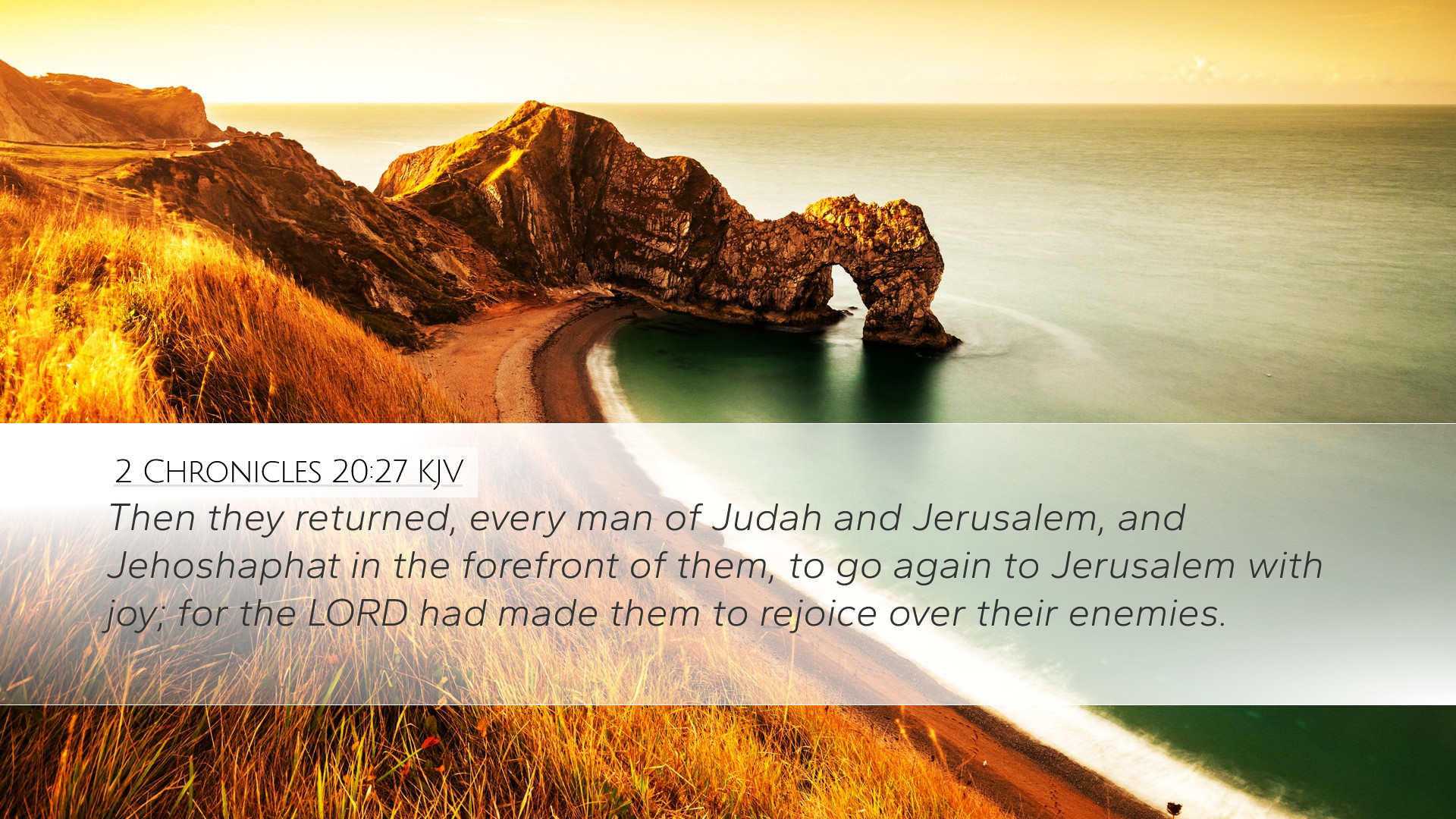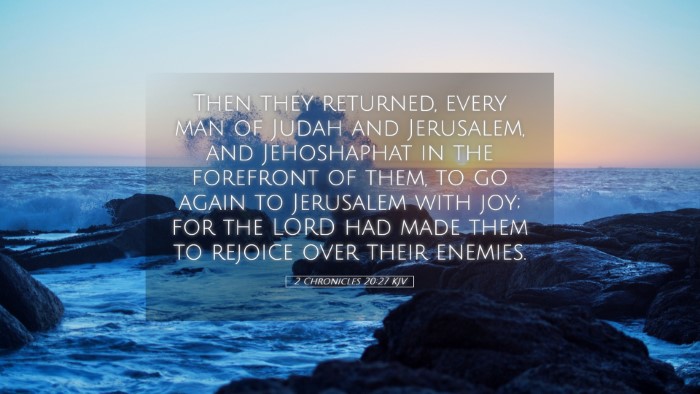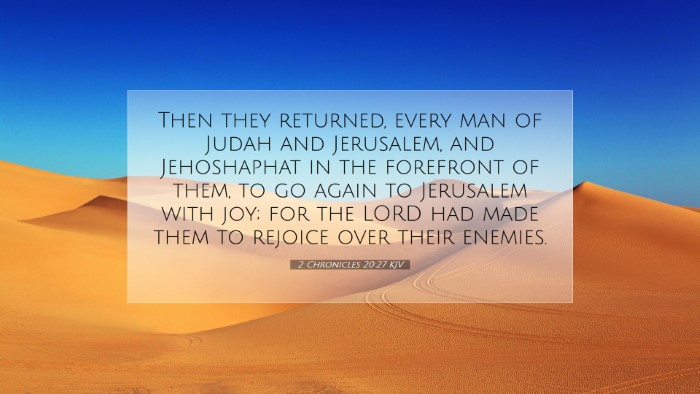Commentary on 2 Chronicles 20:27
Verse Context:
2 Chronicles 20:27 states, "Then they returned, every man of Judah and Jerusalem, and Jehoshaphat in the forefront of them, to go again to Jerusalem with joy; for the LORD had made them to rejoice over their enemies." This passage encapsulates a significant moment in the history of Judah, reflecting the themes of divine deliverance and communal rejoicing.
Significance of the Passage
This verse occurs after a remarkable victory won not by military prowess but through faith and reliance on God. It serves as both a conclusion to the account of King Jehoshaphat’s reliance on God and a reminder to the faithful of God’s providence and protection.
Insights from Public Domain Commentaries
Matthew Henry's Commentary
Restoration of Joy: Henry highlights how joy is a vital response to God's deliverance. The people returned with joy, indicating the internal change wrought by God’s action in their midst. He notes this joy is not merely emotional but rooted in the recognition of God's power and kindness.
Public Display of Gratitude: He emphasizes the importance of public acknowledgment of God's blessings in the lives of His people. The whole of Judah returned to Jerusalem, signifying the unity of the nation, which was important in a time of distress transforming into victory.
Leadership of Jehoshaphat: Jehoshaphat’s role is significant; he led the people in this journey back with joy, which underscores the importance of leadership in worship and communal faith. His faith influenced the nation, demonstrating how righteous leadership can foster a culture of trust in God.
Albert Barnes' Commentary
Triumph in the Lord: Barnes points out that the victory they experienced was a direct result of their faith in God. The phrase "the LORD had made them to rejoice" indicates that this joy is a divine gift, stemming from their dependence on God rather than human efforts. The implication is that true joy comes only from God’s actions on behalf of His people.
Unity in Worship: Barnes stresses that the people’s return to Jerusalem represents a unified response to God’s intervention. Their collective joy reflects their communal faith and emphasizes that worship and thankfulness should be communal experiences as well as personal ones. The act of returning is symbolic of returning to the heart of worship, which is crucial for the nation after experiencing divine intervention.
Adam Clarke's Commentary
Prophetic Assurance: Clarke notes that prior to this moment, the people had been reassured by the prophets about God’s deliverance. Therefore, their joyful return can be seen as a fulfillment of God’s promises through His servants. This highlights the continuity between prophecy, faith, and fulfillment of God’s word in the lives of His people.
Celebration of Victory: He expands on the notion that this joy shouldn't just be seen as a superficial emotion but as part of a broader cultural and spiritual reclamation. The people celebrated God’s victory over their enemies not just as a military win but as an affirmation of God’s sovereignty and faithfulness in their lives.
Theological Implications
This verse invites readers to contemplate several important theological themes:
- The Nature of Divine Deliverance: The victory won is not one that involves human strategies but is purely an act of divine intervention. This challenges contemporary views that often regard success as contingent upon human schemes.
- Joy as a Response to Faith: Joy as a response to God’s deliverance raises questions about worship and emotional expressions in the faith community. How do communities integrate joy into their expressions of faith?
- Collective Identity: The shared experience of victory reinforces the identity of the Israelite community. This aspect is critical for contemporary churches that seek to foster a sense of community in their worship practices.
Application for Today’s Believers
For pastors, students, and theologians, this verse poses several applications:
- Leading with Faith: Leaders should exemplify faith in God during trials and rejoice with those they lead, much like Jehoshaphat.
- Shared Worship: Communities should cultivate environments where joy in the Lord is expressed collectively, recognizing that worship is often richer when shared.
- Remembering God’s Works: Churches should incorporate regular practices of remembrance, celebrating what God has done as a vital part of their worship services.
- Prophetic Voices: Encouraging the prophetic voices within communities to speak into situations and point to God's deliverance can help individuals and congregations navigate difficult circumstances.
Conclusion
2 Chronicles 20:27 provides a profound reflection on joy as a response to God's deliverance. The communal return of Judah and Jehoshaphat serves as a powerful reminder of the importance of faith, worship, and shared identity among God's people. As individuals and communities reflect on this passage, they are called to recognize the significance of divine intervention in their lives and cultivate an atmosphere of joy rooted in God's faithfulness.


